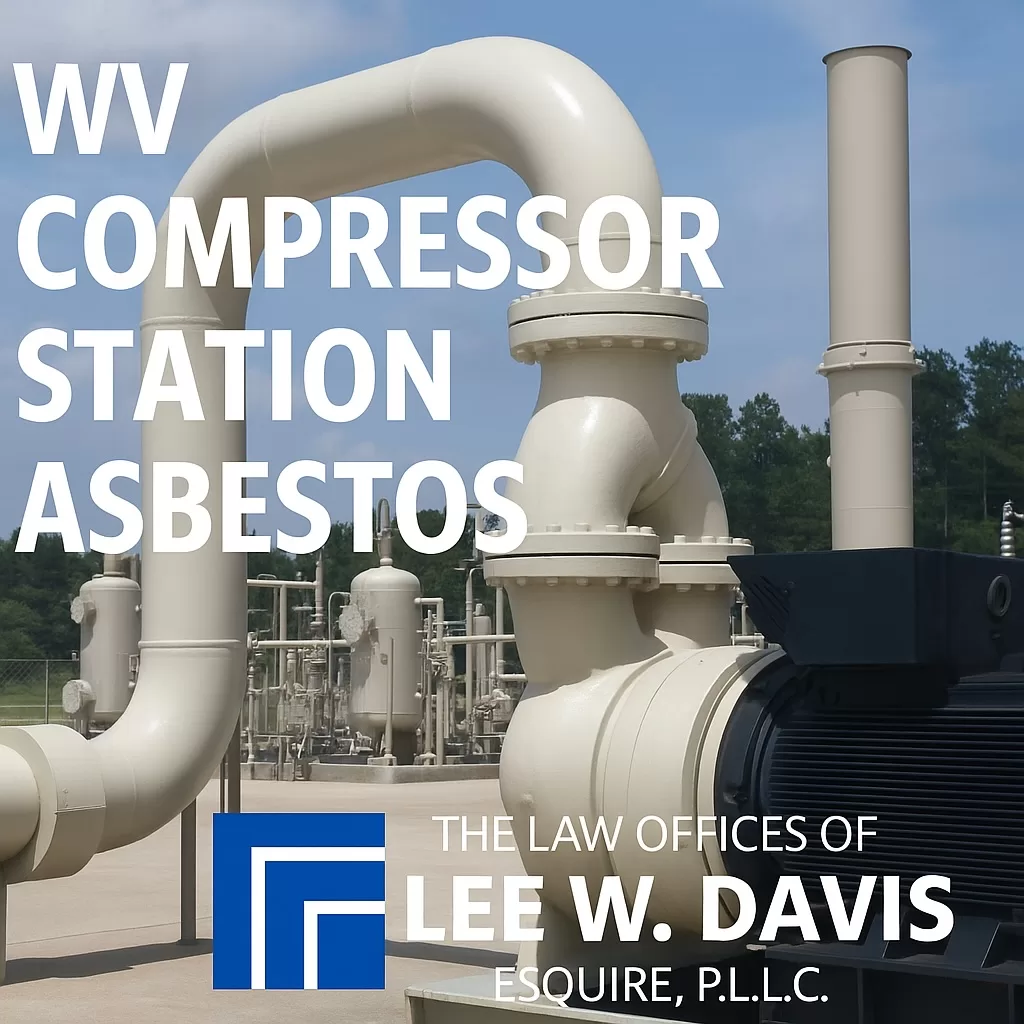For decades, workers across West Virginia encountered dangerous asbestos conditions inside natural gas compressor stations, and many only learned the risks years later. WV Compressor Station Asbestos exposure affected operators, mechanics, welders, pipefitters, electricians, insulators, and contract maintenance crews who kept the state’s gas infrastructure running. These facilities relied on high-heat piping, turbines, boilers, heaters, separators, and massive compressor engines that were insulated with asbestos materials until well into the 1980s.
Mesothelioma/Asbestos Legal Help – WV, MI & PA
Speak directly with attorney Lee W. Davis. No call centers. Free, confidential review.
How Compressor Station Workers Were Exposed
Compressor stations used asbestos because it handled extreme heat and vibration better than anything else available at the time. Workers frequently disturbed:
- Pipe covering on steam and high-temperature lines
- Block insulation on turbine housings
- Asbestos mud, cement, and refractory
- Gaskets, valve packing, and flange seals
- Insulated exhaust systems
- Heater and dehydrator refractory
- Electrical insulation in switchgear and wiring
Exposure was heaviest during:
- Shutdowns and outages
- Rebuilding compressors and turbines
- Pulling valves, flanges, and pumps
- Exchanger, separator, and heater work
- Removing or repairing insulation during hot jobs
- Emergency repairs in confined compressor bays
Dust from old insulation routinely filled engine rooms and mechanical spaces, especially during cold months when ventilation was limited.
Take-Home Asbestos Exposure From Compressor Stations
Many WV compressor station workers unknowingly carried asbestos dust home on:
- Work uniforms
- Jackets, gloves, and boots
- Toolbags
- Lunch coolers and personal gear
Family members—spouses, children, and even parents—were exposed through:
- Shaking out dirty clothes
- Doing laundry
- Riding in contaminated vehicles
- Handling dusty work items brought into the house
This “take-home exposure” led to mesothelioma cases in family members who never worked at compressor stations but lived with someone who did.
WV Compressor Stations With Known Asbestos Use
Workers across West Virginia were exposed at sites operated by:
- Columbia Gas (TCO)
- Dominion / Hope Gas
- Equitrans / EQT
- Energy Transfer / Northeast stations
- Compressor facilities in Doddridge, Lewis, Harrison, Wetzel, Marion, Tyler, Kanawha, and Ritchie Counties
- Older dehydration units and heater buildings along transmission lines
Many of these stations used legacy insulation for decades before upgrades finally occurred.
Diseases Linked to Compressor Station Asbestos
Asbestos exposure can cause:
- Mesothelioma
- Lung cancer
- Asbestosis
- Pleural scarring
These diseases often appear 20–50 years after exposure, meaning retired compressor station workers and family members are being diagnosed today.
Legal Options for WV Workers and Families
If you or a loved one was exposed at a compressor station—or through take-home exposure—you may qualify for:
- Asbestos lawsuits
- Bankruptcy trust claims
- Product-specific claims for gaskets, packing, insulation, refractory
- Wrongful death cases for families
You do not need employment records. Asbestos use at WV compressor stations is well-documented.
Free Case Review
If you worked at a compressor station or were exposed at home through contaminated clothing:
📞 Call 412-781-0525 for a free case evaluation.
Check If Your Family Was Exposed
Get your free guide instantly + a confidential case review.
🔒 100% Confidential. No obligations.
FAQs — WV Compressor Station Asbestos
1. What asbestos products were used in West Virginia compressor stations?
Compressor stations commonly used asbestos-containing gaskets, insulation, packing, brake pads, pipe coverings, flange materials, and turbine insulation blankets. Maintenance workers faced the highest exposure.
2. Were mechanics and operators directly exposed?
Yes. Mechanics, operators, pipeline crews, and maintenance technicians were exposed when opening compressors, replacing gaskets, repairing pumps, removing insulation, grinding, sanding, or cleaning equipment.
3. Can take-home asbestos exposure occur from compressor station work?
Absolutely. Asbestos fibers traveled home on work clothing, boots, gloves, and jackets, exposing spouses and children. These are recognized under West Virginia take-home exposure law.
4. What diseases are linked to compressor station asbestos exposure?
Common diagnoses include:
- Mesothelioma
- Asbestos-related lung cancer
- Asbestosis
- Pleural plaques and thickening
5. Can families file a claim even if the worker passed away?
Yes. West Virginia allows estate and wrongful death claims, including claims for lost wages, funeral expenses, and personal injury damages the worker would have received.
6. Is compensation available if the compressor station closed years ago?
Yes. Most claims are not against the station itself but against the manufacturers of asbestos equipment and products, who remain liable no matter when the exposure occurred.
7. How long do I have to file a compressor-station-related claim?
West Virginia generally requires claims to be filed within 2 years of diagnosis, not the exposure date. Families should contact counsel immediately so evidence can be preserved.
8. Are trust fund claims available for compressor station workers?
Yes. Dozens of companies that supplied valves, pumps, gaskets, insulation, compressors, and brake components to WV compressor stations have active asbestos bankruptcy trusts.
9. Do I need old employment records to file a claim?
Not necessarily. Jobsite knowledge, co-worker testimony, equipment lists, and your own historical reconstruction often provide enough detail to establish exposure.
10. How can a lawyer help with a compressor station asbestos claim?
An attorney identifies exposure sources, files against all responsible companies, handles trust fund submissions, documents medical injuries, and maximizes compensation with no upfront cost.
Mesothelioma/Asbestos Legal Help – WV, MI & PA
Speak directly with attorney Lee W. Davis. No call centers. Free, confidential review.

